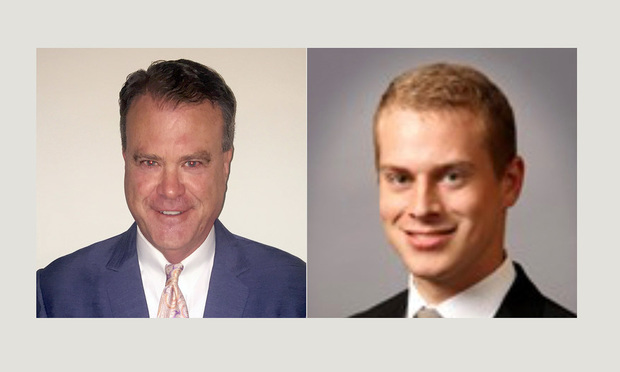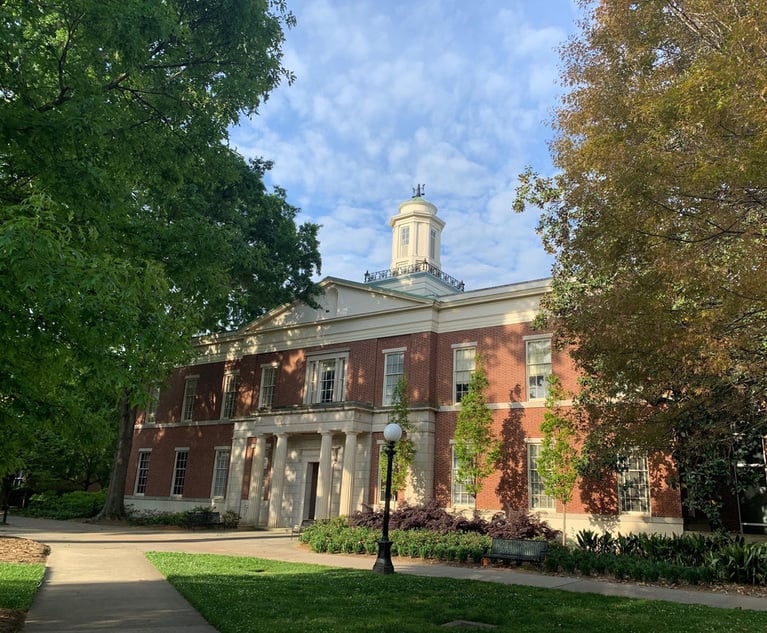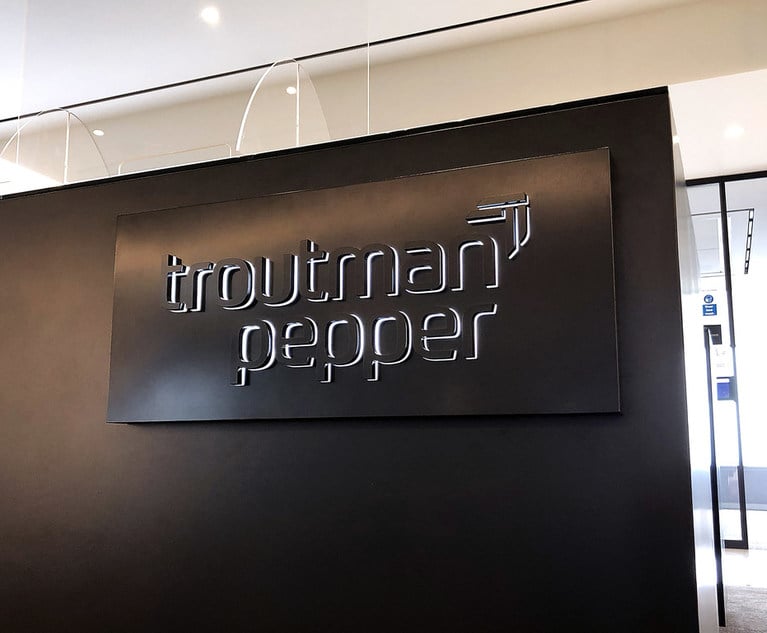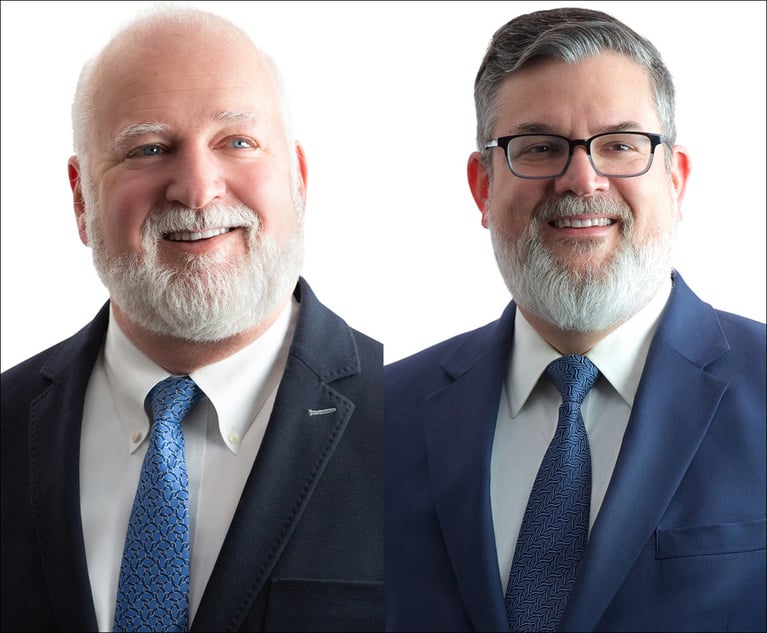Don't Be 'That Lawyer'—Fix Your Fee Contract Today!
Professionalism is its own reward but, like any job done well, highly professional lawyers tend to have the greatest financial success in private practice.
November 19, 2019 at 01:57 PM
5 minute read
 Chief Judge Christopher Edwards (left) and Kyle Timmons (Courtesy photos)
Chief Judge Christopher Edwards (left) and Kyle Timmons (Courtesy photos)
Do you want to be "that lawyer" who sues clients for fees, or "that lawyer" who works hard but walks away from unpaid fees to avoid suing clients? Amend your future fee contracts today and avoid the misery of being either kind of "that lawyer."
Here are two useful clauses to include in your fee contracts. First, an arbitration clause in your fee contact is commended to you by the Supreme Court of Georgia and the State Bar of Georgia. Second, a client complaint clause in your fee contract is enforceable under an important Court of Appeals decision. We also guarantee you will be better looking. Keep reading to find out how!
First, include a Georgia Bar Fee Arbitration clause in your fee contract. The Supreme Court of Georgia's "Specific Aspirational Ideals" suggests such a clause: "As to clients, I will aspire … [t]o fair and equitable fee agreements. As a professional, I should … [r]esolve all fee disputes through the arbitration methods provided by the State Bar of Georgia." Clients and lawyers can contractually submit to mandatory binding fee arbitration by the Bar's Committee on Arbitration in the fee contract. To be arbitrated, the disputed fee must be over $750 worth of legal services performed in Georgia by a Georgia lawyer, must be within the previous two years, not already fixed in amount by law nor court order, and not already the subject of pending litigation. The full text of Georgia Bar Rule 6-204 can be found online at https://www.gabar.org/handbook/#handbook/rule549. The Georgia Bar Fee Arbitration staff fields questions with alacrity at 404-527-8750.
What should your fee arbitration clause include? The fee arbitration clause must state all fee disputes shall be resolved solely, exclusively, and finally through the arbitration methods provided by the State Bar of Georgia, under Georgia Bar Rule 6-204. Rule 6-204 requires your fee contract arbitration provision follow three simple but strict rules.
- The fee contract's fee arbitration clause must be in a separate paragraph.
- The fee arbitration language clause font must be at least as large as the language in the remainder of the contract, preferably larger.
- The fee arbitration clause should include adjacent lines on the contract for both the lawyer's and the client's initials and must be initialed by both.
These three rules ensure that the client and lawyer mutually consent to the fee arbitration clause. If your client fails to pay your fee, or if your client disagrees with your fee, the Committee on the Arbitration of Attorney Fee Disputes will render an enforceable decision, at the request of the client or the lawyer.
Second, include a client complaint clause in your fee contract. Your case at arbitration will be much stronger if you follow the guidance of Loveless v. Sun Steel, Inc., 206 Ga. App. 247, 424 S.E. 2d 887 (1992). In Loveless, a client complaint clause was included in the fee contract, stating "any complaint regarding the legal services provided or the amount charged therefor must be definitive, in writing and received by [lawyer] within 30 days of billing or it is waived." Id. at 248, 424 S.E.2d at 889. This client complaint clause creates an estoppel barring evidence of client complaints that are not definite, written, and timely. This clause won summary judgment for the lawyer in that litigated fee dispute because no definite, timely, written complaint was received by the lawyer from the client. Georgia Bar arbitrations follow Georgia law, so under Loveless, this clause may be argued at arbitration to create the same contractual evidentiary estoppel as in litigation. ("During arbitration proceedings, the general rules of contract construction apply." Sweatt v. Int'l Dev. Corp., 242 Ga. App. 753, 755, 531 S.E.2d 192, 194 (2000); "Contracts are to be governed as to their nature, validity, and interpretation by the law of the place where they were made." Convergys Corp. v. Keener, 276 Ga. 808, 811, 582 S.E.2d 84, 86 (2003)). This clause is more helpful if your practice sends monthly or periodic billings, but it should still apply upon final billing that is not met with a timely, definite, written complaint.
Professionalism is its own reward but, like any job done well, highly professional lawyers tend to have the greatest financial success in private practice. The most professional lawyers, who read and follow the Supreme Court's advice, are generally happier and have the best client relations. Professional lawyers are also better-looking, because clients, colleagues, judges, and even adversaries, are happy to see them. If this article has been helpful to you, please take half an hour to read and contemplate the other useful pointers written to you by the Supreme Court of Georgia, called "Specific Aspirational Ideals" at https://www.gabar.org/aboutthebar/lawrelatedorganizations/cjcp/lawyers-creed.cfm. The best, brightest lawyers and judges among us wrote these Ideals to tell you what works to be happy, successful and better looking. (The authors thank Rita Payne and Tom Humphries of the Georgia Bar Committee on Arbitration for their helpful refinements.)
Christopher C. Edwards is the chief judge of Superior Court of the Griffin Judicial Circuit and now serves on the Board of Governors and on the Board of the General Practice and Trial Section of the State Bar of Georgia.
Kyle Harris Timmons is a graduate of the 2017 class of Mercer Law and currently serves as Judge Edwards' staff attorney in the Griffin Judicial Circuit.
This content has been archived. It is available through our partners, LexisNexis® and Bloomberg Law.
To view this content, please continue to their sites.
Not a Lexis Subscriber?
Subscribe Now
Not a Bloomberg Law Subscriber?
Subscribe Now
NOT FOR REPRINT
© 2025 ALM Global, LLC, All Rights Reserved. Request academic re-use from www.copyright.com. All other uses, submit a request to [email protected]. For more information visit Asset & Logo Licensing.
You Might Like
View All
28 Firms Supporting Retired Barnes & Thornburg Litigator in Georgia Supreme Court Malpractice Case
7 minute read
Troutman Pepper Says Ex-Associate Who Alleged Racial Discrimination Lost Job Because of Failure to Improve
6 minute read

Law Firms Expand Scope of Immigration Expertise Amid Blitz of Trump Orders
6 minute readTrending Stories
- 1Pa. Superior Court Rules Pizza Chain Liable for Franchisee Driver's Crash
- 2New FCC Chair Hires Section 230 Critic as General Counsel
- 3Sylvia Favretto Elevated to Mysten Labs’ General Counsel
- 4Vanessa Roberts Avery Rejoins McCarter & English
- 5Charlie Javice Jury Will Not See Her Texts About Elizabeth Holmes
Who Got The Work
J. Brugh Lower of Gibbons has entered an appearance for industrial equipment supplier Devco Corporation in a pending trademark infringement lawsuit. The suit, accusing the defendant of selling knock-off Graco products, was filed Dec. 18 in New Jersey District Court by Rivkin Radler on behalf of Graco Inc. and Graco Minnesota. The case, assigned to U.S. District Judge Zahid N. Quraishi, is 3:24-cv-11294, Graco Inc. et al v. Devco Corporation.
Who Got The Work
Rebecca Maller-Stein and Kent A. Yalowitz of Arnold & Porter Kaye Scholer have entered their appearances for Hanaco Venture Capital and its executives, Lior Prosor and David Frankel, in a pending securities lawsuit. The action, filed on Dec. 24 in New York Southern District Court by Zell, Aron & Co. on behalf of Goldeneye Advisors, accuses the defendants of negligently and fraudulently managing the plaintiff's $1 million investment. The case, assigned to U.S. District Judge Vernon S. Broderick, is 1:24-cv-09918, Goldeneye Advisors, LLC v. Hanaco Venture Capital, Ltd. et al.
Who Got The Work
Attorneys from A&O Shearman has stepped in as defense counsel for Toronto-Dominion Bank and other defendants in a pending securities class action. The suit, filed Dec. 11 in New York Southern District Court by Bleichmar Fonti & Auld, accuses the defendants of concealing the bank's 'pervasive' deficiencies in regards to its compliance with the Bank Secrecy Act and the quality of its anti-money laundering controls. The case, assigned to U.S. District Judge Arun Subramanian, is 1:24-cv-09445, Gonzalez v. The Toronto-Dominion Bank et al.
Who Got The Work
Crown Castle International, a Pennsylvania company providing shared communications infrastructure, has turned to Luke D. Wolf of Gordon Rees Scully Mansukhani to fend off a pending breach-of-contract lawsuit. The court action, filed Nov. 25 in Michigan Eastern District Court by Hooper Hathaway PC on behalf of The Town Residences LLC, accuses Crown Castle of failing to transfer approximately $30,000 in utility payments from T-Mobile in breach of a roof-top lease and assignment agreement. The case, assigned to U.S. District Judge Susan K. Declercq, is 2:24-cv-13131, The Town Residences LLC v. T-Mobile US, Inc. et al.
Who Got The Work
Wilfred P. Coronato and Daniel M. Schwartz of McCarter & English have stepped in as defense counsel to Electrolux Home Products Inc. in a pending product liability lawsuit. The court action, filed Nov. 26 in New York Eastern District Court by Poulos Lopiccolo PC and Nagel Rice LLP on behalf of David Stern, alleges that the defendant's refrigerators’ drawers and shelving repeatedly break and fall apart within months after purchase. The case, assigned to U.S. District Judge Joan M. Azrack, is 2:24-cv-08204, Stern v. Electrolux Home Products, Inc.
Featured Firms
Law Offices of Gary Martin Hays & Associates, P.C.
(470) 294-1674
Law Offices of Mark E. Salomone
(857) 444-6468
Smith & Hassler
(713) 739-1250






